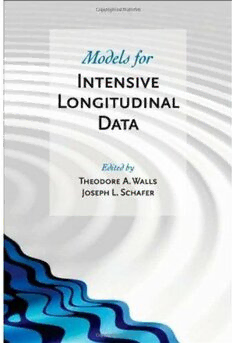Download Models for intensive longitudinal data PDF Free - Full Version
Download Models for intensive longitudinal data by Theodore A. Walls, Joseph L. Schafer in PDF format completely FREE. No registration required, no payment needed. Get instant access to this valuable resource on PDFdrive.to!
About Models for intensive longitudinal data
Rapid technological advances in devices used for data collection have led to the emergence of a new class of longitudinal data: intensive longitudinal data (ILD). Behavioral scientific studies now frequently utilize handheld computers, beepers, web interfaces, and other technological tools for collecting many more data points over time than previously possible. Other protocols, such as those used in fMRI and monitoring of public safety, also produce ILD, hence the statistical models in this volume are applicable to a range of data. The volume features state-of-the-art statistical modeling strategies developed by leading statisticians and methodologists working on ILD in conjunction with behavioral scientists. Chapters present applications from across the behavioral and health sciences, including coverage of substantive topics such as stress, smoking cessation, alcohol use, traffic patterns, educational performance and intimacy. Models for Intensive Longitudinal Data (MILD) is designed for those who want to learn about advanced statistical models for intensive longitudinal data and for those with an interest in selecting and applying a given model. The chapters highlight issues of general concern in modeling these kinds of data, such as a focus on regulatory systems, issues of curve registration, variable frequency and spacing of measurements, complex multivariate patterns of change, and multiple independent series. The extraordinary breadth of coverage makes this an indispensable reference for principal investigators designing new studies that will introduce ILD, applied statisticians working on related models, and methodologists, graduate students, and applied analysts working in a range of fields. A companion Web site at www.oup.com/us/MILD contains program examples and documentation.
Detailed Information
| Author: | Theodore A. Walls, Joseph L. Schafer |
|---|---|
| Publication Year: | 2006 |
| ISBN: | 9780195173444 |
| Pages: | 311 |
| Language: | English |
| File Size: | 2.288 |
| Format: | |
| Price: | FREE |
Safe & Secure Download - No registration required
Why Choose PDFdrive for Your Free Models for intensive longitudinal data Download?
- 100% Free: No hidden fees or subscriptions required for one book every day.
- No Registration: Immediate access is available without creating accounts for one book every day.
- Safe and Secure: Clean downloads without malware or viruses
- Multiple Formats: PDF, MOBI, Mpub,... optimized for all devices
- Educational Resource: Supporting knowledge sharing and learning
Frequently Asked Questions
Is it really free to download Models for intensive longitudinal data PDF?
Yes, on https://PDFdrive.to you can download Models for intensive longitudinal data by Theodore A. Walls, Joseph L. Schafer completely free. We don't require any payment, subscription, or registration to access this PDF file. For 3 books every day.
How can I read Models for intensive longitudinal data on my mobile device?
After downloading Models for intensive longitudinal data PDF, you can open it with any PDF reader app on your phone or tablet. We recommend using Adobe Acrobat Reader, Apple Books, or Google Play Books for the best reading experience.
Is this the full version of Models for intensive longitudinal data?
Yes, this is the complete PDF version of Models for intensive longitudinal data by Theodore A. Walls, Joseph L. Schafer. You will be able to read the entire content as in the printed version without missing any pages.
Is it legal to download Models for intensive longitudinal data PDF for free?
https://PDFdrive.to provides links to free educational resources available online. We do not store any files on our servers. Please be aware of copyright laws in your country before downloading.
The materials shared are intended for research, educational, and personal use in accordance with fair use principles.

